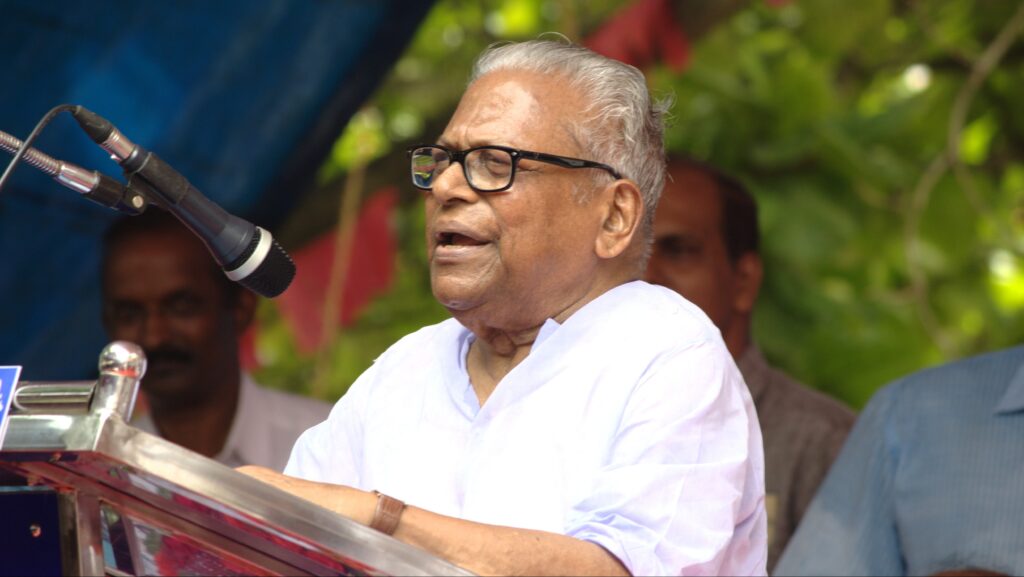IF CPI(M) veteran V S Achuthanandan came to be known as a relentless fighter, he began early.
Having dropped out of school to join his elder brother’s tailoring shop at their native village Punnapra, Achuthan – as he was known then – was exposed to tales of oppression, including denial of wages, of toddy and coir workers. After he joined a coir factory at Aspinwall, he also got swept into trade unionism.
In 1941, Communist leader P Krishna Pillai asked an 18-year-old Achuthanandan to organise the farm workers of Kuttanad in Alappuzha, who were unhappy about their abysmal working conditions and squalid living circumstances. The young leader soon made his mark, walking miles, day after day, to achieve the task.
Recalling that tough time later, VS talked about staying in houses located in the middle of paddy fields, reached via wooden planks placed across streams. His speeches to farmers then, spread out across the vast paddy fields, without the aid of a public address system, would go on to define his distinctive speaking style – later a fodder for Kerala’s mimicry artists.
It was thus that VS established the Travancore Karshaka Thozhilali Union, which later grew into the Kerala State Karshaka Thozhilai Union, a CPI(M)-affiliated trade union of farm workers.
During the 1946 Punnapra-Vayalar uprising, a historical struggle against Diwan C P Ramaswami Iyer of Travancore, a camp led by VS took charge of making sharpened lances out of arecanut tree planks to use against police. As the heat on him grew, the party asked VS to go into hiding, but police found and arrested him from Poonjar in Kottayam.
At the police lock-up in Pala, he was subjected to brutal torture, so much so that police thought VS had died. It was while he was being taken for burial that he was discovered to be breathing, and the veteran got a new lease of life. But Alappuzha police again jailed him for 15 months, on charges of organising people against the government.
In 1948, when the Communist party was banned, he was again arrested and jailed.
After the first Communist government took over in Kerala in 1958, VS was the CPI district secretary. In his maiden speech in the Assembly in 1967 as an MLA, Achuthanandan took up his pet issue of rights of coir workers and fishermen. He was also active in debates that led to the Kerala Toddy Workers’ Welfare Act of 1969, and was critical in the formulation of the then CPI-led government’s legislation for agricultural workers.
When the Emergency was declared, Achuthanandan, then the Ambalapuzha MLA, was arrested and jailed for 21 months.
In 1997, when the LDF was in power and VS its convenor, he organised an agitation against the reclamation of paddy fields, mainly in Alappuzha, with the protesters even mowing down standing crops grown on the reclaimed land. While this did not go down well with civil society, the protest was eventually instrumental in the enactment of the Kerala Conservation of Paddy Land and Wetland Act, 2008.
Achuthandanan’s political journey took another turn during his stint as Opposition leader in 2001-2006, when he emerged as a darling of the masses as well as CPI(M) cadres. Already an octogenarian, he forayed into every battle ground, embraced every social issue, even taking a trek through the hills as part of his fight against “encroachment” of the Mathikettan Shola forest. The forest was eventually declared a national park in 2003.
The palmolein import scam, which emerged during the Congress regime of 1990-96, was another legal battle taken up by him.
VS’s campaign led to the conviction of senior UDF politician R Balakrishna Pillai over a corrupt deal when he was in the government. VS next became a litigant in the sensational ice cream parlour sex scandal case, which was exposed under the LDF regime of 1996-2001, not deterred even when the Supreme Court rejected his petition.
In 2015, by when the UDF was in power in the state, VS joined the protest of women estate workers in Munnar.
Sometimes, his fight went beyond the state borders. In 2012, VS ventured out to Kudankulam in Tamil Nadu to pledge solidarity with an anti-nuclear protest, but was stopped at the state border.

